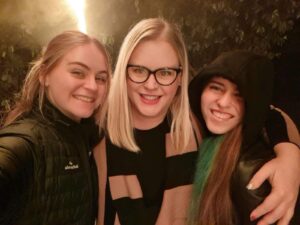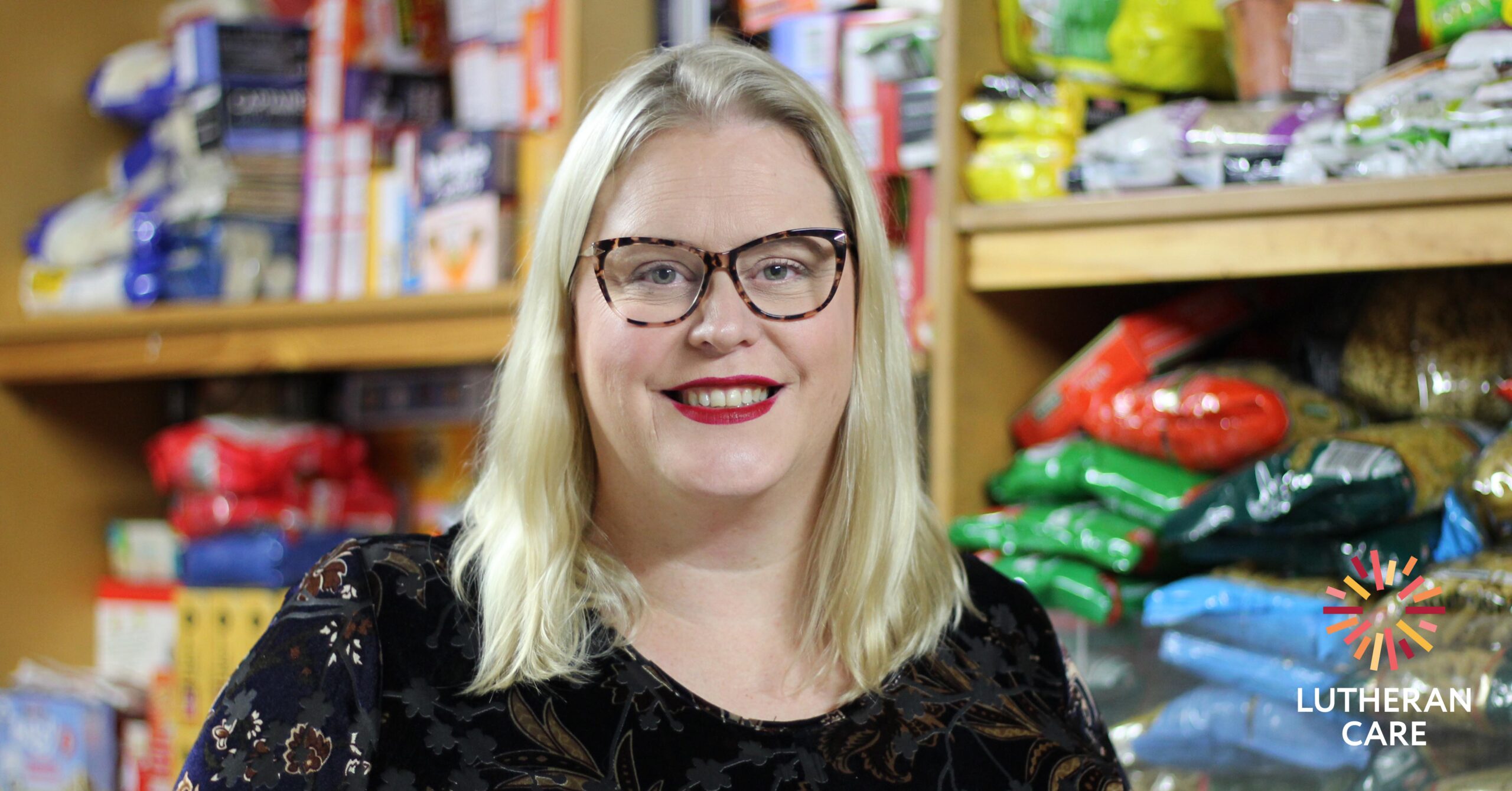It was a flyer on a volunteering noticeboard in a Barossa Valley library in 2011 that first brought Kelly Hughes into Lutheran Care’s orbit.
Kelly was a stay at home mum, whose youngest daughter had just started kindergarten, freeing up some time for Kelly to give back to the community and make some local connections. She and her family had recently moved to the Barossa after some time in the Pilbara in Western Australia, and Central Australia.
After getting her foot in the door of Lutheran Care as a volunteer, fast forward to this January, and Kelly has just marked 10 years as a Lutheran Care employee. A key member of Lutheran Care’s leadership team as Operations Manager Financial Wellbeing, Kelly is one of the Lutheran Care women we are highlighting as part of International Women’s Day, 2024.
Since starting with Lutheran Care, Kelly has witnessed three rebranding exercises, astonishing growth in the number of programs and the way they are delivered, and massive changes in the financial landscape. Kelly’s Financial Counselling team must now support clients through pitfalls such as scams and Buy Now Pay Later schemes – which the sector couldn’t have predicted in its wildest dreams a decade ago.
Much has changed, but what hasn’t, is Kelly’s huge lipsticked smile and big heart for helping people.
When Kelly first saw the ad for volunteering at Lutheran Care (then Lutheran Community Care), she spoke to the local Barossa office manager, Leanne, and was introduced to the Emergency Relief program, which provides support such as food, bedding and referrals to services for families and individuals in crisis. Kelly embraced her Emergency Relief volunteer role and enjoyed welcoming and interviewing clients and linking them to the immediate and ongoing help they needed.
“I was given training, but I couldn’t believe I was allowed to talk to clients – I thought I’d be packing hampers,” Kelly shares.
She welcomed the new challenge, after having previously worked in records for local government, and being a stay-at-home mum for several years.
“I loved the environment. It was a new industry I’d never even considered before.”
One of the first clients Kelly worked with was a local gentleman with an intellectual disability who was being income managed by the Public Trustee. He came in for food relief and budgeting support.
“I took him on as a client, and worked with him,” Kelly says. “It turned into me becoming a volunteer budget worker. I saw the difference having someone check in with him around his finances made on him. I met with him weekly, which turned into fortnightly or monthly, then he would pop in to see me when he needed.”
Feeling good about making a difference, and inspired by the results she saw Lutheran Care Financial Counsellor Jude Bradshaw getting with clients, Kelly was encouraged to do a Diploma in Financial Counselling, which led to a paid position with Lutheran Care after three years of volunteering.
“The universe just put everything in the right spot,” Kelly says.
Over the years, Kelly found it interesting to see how the Financial Counselling program, and Lutheran Care more broadly, professionalised and grew. More sites and services were added and Lutheran Care continued to grow its positive reputation and generate respect in the sector.
“We’re now playing with the ‘big boys’,” Kelly says. “The government and funders don’t hesitate to approach us when they need information. We sit at the table when important things are planned for and needed in the sector.”
One example of this, was how during the height of the Covid-19 pandemic, there was a push to roll back bank loan regulations, which would reduce the responsibility of banks to ensure that the person requesting a loan could actually afford to service it.
“As an industry, we really used our voice to take that off the table,” Kelly says.
Over the past decade, money and the way people use it has also changed.
“Money isn’t real because we don’t touch it anymore,” Kelly says. “It’s digital, it’s numbers on a page.”
Kelly is concerned about the emergence of Buy Now Pay Later products, which many people sign up to as a financial bandaid before they realise how quickly large debts can accrue.
“Buy Now Pay Later products didn’t exist when I started,” Kelly says. “They’re designed to trip people up. Buy Now Pay Later providers are unregulated. There is a voluntary code of conduct, but legislation struggles to keep up with them.”
Scams are another area of concern.
“New technology has really allowed scams to take off,” Kelly says.
Kelly and her team hear of cases every week where someone has been scammed, sometimes to the tune of thousands of dollars or their entire savings.
“It’s something that a lot of people are really embarrassed about,” she says.
“Even with a daughter who is a Financial Counsellor, my Mum has nearly been scammed.”
The change in legislation during Covid to allow people to remove up to $20,000 from their Superannuation was another shift that Kelly predicts will see people having money struggles down the track.
“Every three or four clients were wanting to take their super – we encouraged them to look at other options,” Kelly says.
These days, Kelly now supports eight staff and around 10 volunteers. They run a client-centric service.
“The client makes the decision about what they need for their future and we support them with that, not the other way around,” Kelly says.
As if she isn’t busy enough, Kelly is a Director on the South Australian Financial Counsellors Association – the peak body for Financial Counselling, and also sits on the National Representative Council for Financial Counselling Australia. She is currently studying a Master’s in Business Administration in Social Impact and completed a Graduate Certificate in leadership through UniSA.
She loves working in the not-for-profit world and is keen to continue expanding and adding programs that improve the lives and wellbeing of people in the community, including improving mental health outcomes through better financial wellbeing and treating clients in a holistic way.
“Using my voice to advocate for those who can’t is what I love,” Kelly says. “The heart of Lutheran Care is treating clients as a whole person – we consider their family and family situations. This is encouraged from the top down.”
There used to be a sign up in the Barossa office that reminded the team to treat clients with ‘Unconditional Positive Regard’. This meant, Kelly explains, that it didn’t matter, “What they’re wearing, what they look like… it was a clean slate every time they walked in the door”.
Kelly and her team still live by this lesson today in how they treat their clients.
There is not a one-size-fits-all when it comes to people who would benefit from seeing a Financial Counsellor.

“Everyone everywhere is struggling at the moment,” she says. “Everyone’s financial life looks different at the moment to what it used to a few years ago.”
Kelly suggests there are things we can all do to better educate ourselves and our families about good financial habits.
For many, discussing finances, budgets and stressors is seen as a private affair, however Kelly encourages people to seek help and “talk about money”.
“We need to get the message out that it’s OK not to be OK financially.”
She recommends the Moneysmart website, https://moneysmart.gov.au/, which includes easy to understand information and resources.
She also recommends Ask Izzy – https://askizzy.org.au/ – which connects people who are in crisis with local supports and services, anything from a place to get a free breakfast, to a dentist.
Kelly’s top tip: “Teach your kids young – talk about money with your kids from the very beginning.”
Speaking of kids, Kelly’s daughters are now 19 and 17, and she has passed on her strong social conscience to them.
“They both volunteer, helping with Christmas hampers. They hear the stories. They’ve grown up in this, heard it for their whole lives. They understand their experience is not everybody’s experience.”
Kelly’s mum is also a Lutheran Care volunteer, proving that social justice is in the blood of these three generations of women who put their care into action for people less fortunate.

